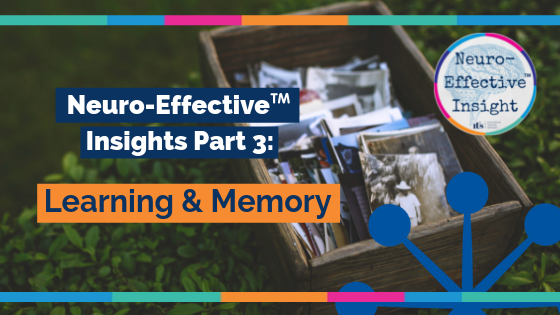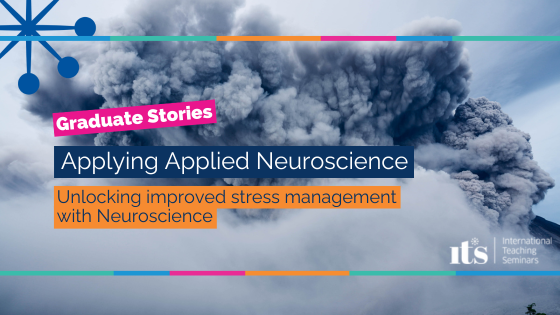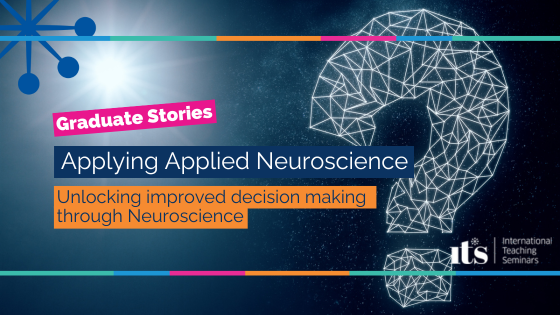Neuro-Effective™ Insights: Part 3 Learning & Memory
Learning & Memory is one of the most important topics we can have an understanding of, and that allows us to assist others to optimise performance. Learning & memory go together because you want to learn something for more than just the next hour of your life (most of the time!). What’s happening in the brain as we develop expertise and acquire new knowledge? There are so many neuro-mechanisims in play which really puts the responsibility on your own shoulders. If you want to know some specific practical techniques, then here are 5 ways neuroscience can help you improve your memory: Making Learning Stick.
Every workplace requires people to be able to learn skills, to remember information, and to use both the skills and information effectively in their roles. Many workplaces use complicated induction procedures, training courses, and away days where employees are loaded with the information required to function in the workplace. And yet there is often little consideration of how to best communicate this information – potentially costing huge sums when information is not effectively provided.
Neuro-Effective™ Insights
Neuro-Effective™ Insight #7: Neuroplasticity
Neuroplasticity refers to the ability of your brain to adapt and develop at any age according to the demands put upon it and the challenges you face.
Recent neuroscientific research makes clear that we have consistently underestimated just how much adaptability is possible. What is the potential of the human brain? How much can we learn? Right now the answer would seem to be that the sky is the limit. Perhaps there will be a limit, but there is no sign that we have reached it yet.
What we do know is that limiting beliefs about what is possible can limit our potential. Neuroscience can address those limiting beliefs and help us have more control and so fulfil our own potential.
As soon as you know what’s going on in your brain, figuring out what you need to do to learn better becomes obvious. That’s why this knowledge is so important to people.
Your brain is the product of your experience. There is definitely an element of use it or lose it in play here.
Neuro-Effective™ Insight #8: Organisational Habits
Habits are incredibly efficient streamlined strategies. We all have personal habits – some of which we know we don’t want and some of which help us to perform more efficiently and that we want to keep. But what habits are at play in your organisation? Are they working for you or not? How might you begin to recognize these, reflect on which are worth changing, and begin to put better habits in place?
There are mechanisms in the brain that help us understand how habits are created, broken & replaced. Applied Neuroscience gives us the next steps to make the changes we want.
Neuro-Effective™ Insight #9: The Common Sense Myth of Memory
Ever disagreed on the memory of an event with a friend, colleague, loved one? Sure you have. We’ve all read the minutes of a meeting we thought we’d been at, only to think again after seeing them! Common sense myth is that memory is accurate. Neuroscience gives us an understanding of why it makes no sense for memory to be accurate and the answers to some important questions; What is memory for? How can you ensure you have accurate memories when you need them? How can you ensure more cohesion and shared understanding in a team?
By understanding how memory really works, we can improve our ability to retain information, become more understanding when communicating with others, and create more coherent narratives about ourselves.
As Oscar Wilde said , “Memory is the diary we all carry about with us.” What does yours say?
There is a whole world to explore here which offers us a whole new way of thinking – and a unique power to transform.
With that comes more choice and more ability to make a difference in a way that matters to you. To read more, take a look at the other 4 parts of this Neuro-Effective™ Insights series:
Being Neuro-Effective™: the 5 key areas where neuroscience can give you the edge
Neuro-Effective™ Insights Part 1: Emotional Regulation & Motivation
Neuro-Effective™ Insights Part 2: Creativity & Insight
Neuro-Effective™ Insights Part 4: Decision Making & Planning
Neuro-Effective™ Insights Part 5: Stress, Resilience & Contemplation
To immerse yourself in this way of thinking and learning, please join us on the Applied Neuroscience Programme that we co-created.
This article is co-authored by Ian McDermott and Professor Patricia Riddell





Leave A Comment